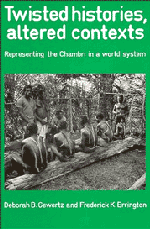Book contents
- Frontmatter
- Contents
- List of illustrations
- Acknowledgements
- Introduction: On writing the Chambri
- 1 The new traditionalism: tourism and its transformations
- 2 The initiation: making men in 1987
- 3 The town
- 4 Western representations at home
- 5 The written word
- 6 Negotiating with the state
- Conclusion: Interlocking stories, intersecting lives
- Appendix A: Godfried Kolly's life story
- Notes
- References
- Index
Introduction: On writing the Chambri
Published online by Cambridge University Press: 05 June 2012
- Frontmatter
- Contents
- List of illustrations
- Acknowledgements
- Introduction: On writing the Chambri
- 1 The new traditionalism: tourism and its transformations
- 2 The initiation: making men in 1987
- 3 The town
- 4 Western representations at home
- 5 The written word
- 6 Negotiating with the state
- Conclusion: Interlocking stories, intersecting lives
- Appendix A: Godfried Kolly's life story
- Notes
- References
- Index
Summary
“When there is development there is always changes. We must choose the best way to cause the development.” We found this unelaborated statement in 1987, under the heading of “Social Studies,” on one of the last pages of Angela Imbang's school notebook still remaining in the outhouse. When Angela copied it the previous year from the blackboard of the Chambri Community School, she was in her sixth and for her, as for most Chambri and other Papua New Guinea children, the final year of formal education in a nationally determined curriculum.
Angela was not a strong student. Certainly she felt scant motivation to preserve her notebooks, and she in fact understood little of the English she had written down. Because she had not done well enough to be admitted to high school, she doubted she would ever have a regular job. Yet, the expectations about development contained in the statement she copied had become pervasive in Papua New Guinea and were fully endorsed by Angela and other Chambri (and, in our experience, by many other Papua New Guineans). While recognizing that their lives were constrained by, for instance, the educational requirements of even low-level clerical jobs they had come to believe, nonetheless, that their lives were, and should be, significantly different from the lives of those who came before and those who would come after them. Furthermore, they believed that they would, through their choices, be able to lead better lives.
- Type
- Chapter
- Information
- Twisted Histories, Altered ContextsRepresenting the Chambri in the World System, pp. 1 - 24Publisher: Cambridge University PressPrint publication year: 1991



